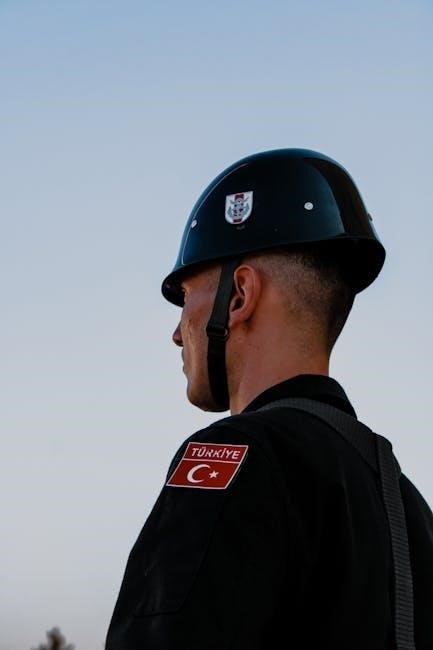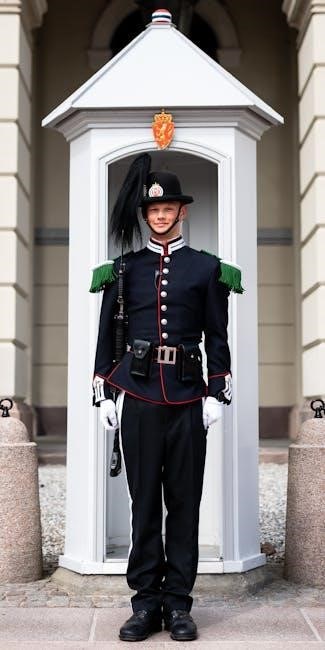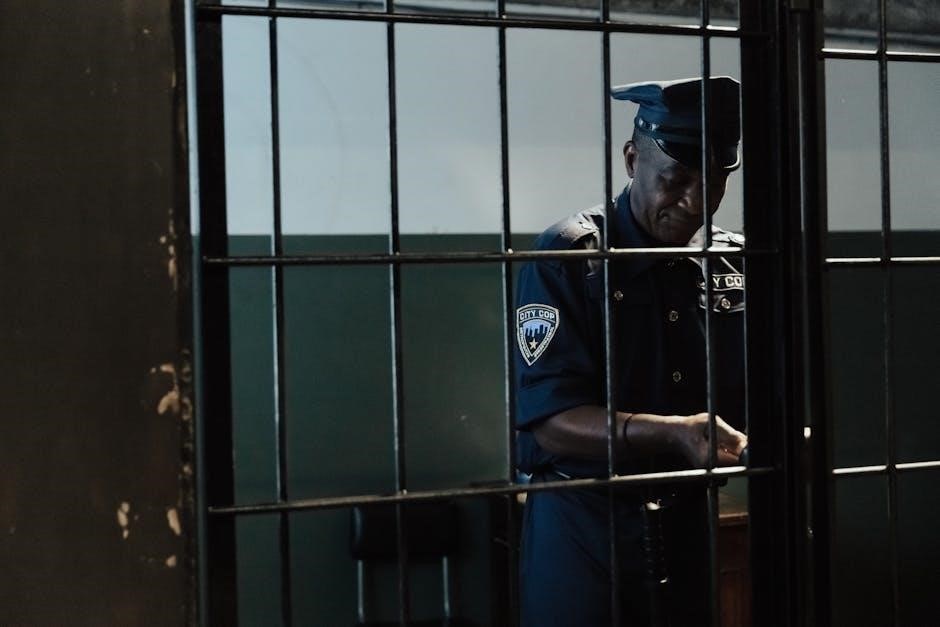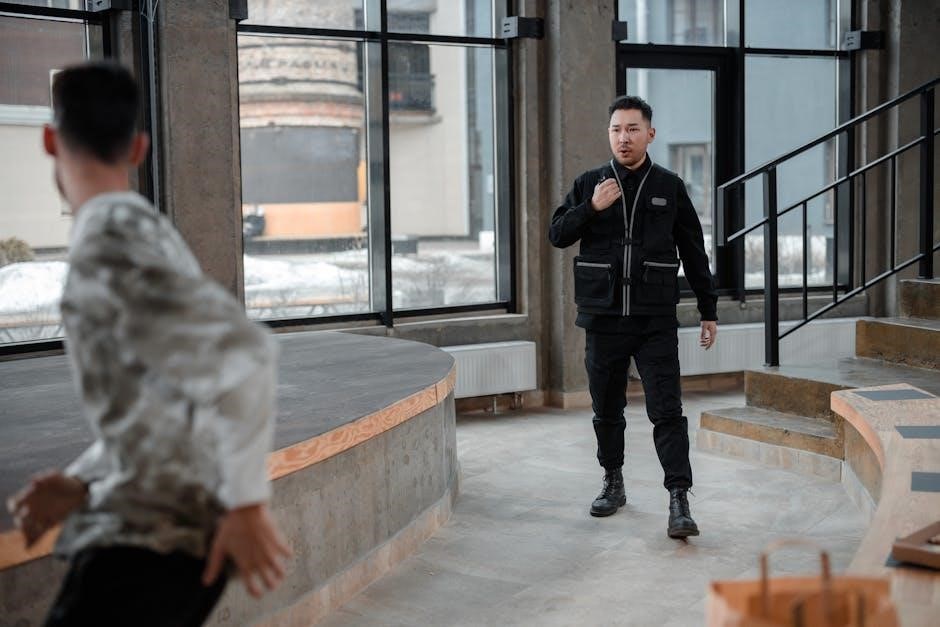Security guards play a critical role in maintaining safety and order by patrolling premises, monitoring surveillance, and inspecting access points. Their duties ensure protection of property and personnel, adapting to various settings like corporate, residential, or industrial environments. Understanding their responsibilities is essential for effective security strategies and incident prevention.
1.1 Overview of the Role of Security Guards
Security guards are essential for safeguarding premises, personnel, and assets. Their primary duties include patrolling areas, monitoring surveillance systems, inspecting access points, and authorizing entry. They prevent theft, observe suspicious activities, and ensure compliance with safety protocols. Guards collaborate with staff and visitors, maintaining order and providing assistance during emergencies, making them a crucial element in organizational security and safety management systems.
1.2 Importance of Understanding Duties and Responsibilities
Understanding security guard duties is vital for effective performance and accountability. Clear knowledge ensures adherence to legal authority, proper incident response, and maintenance of safety standards. It fosters professionalism, ethical conduct, and teamwork, enhancing overall security operations and organizational trust. This understanding also aids in continuous training and adaptation to new security protocols and procedures, ensuring optimal protection of people and property.

Core Duties of Security Guards
Security guards are responsible for patrolling premises, monitoring surveillance systems, and inspecting access points to prevent unauthorized entry and ensure safety. They maintain vigilance to deter threats, respond to incidents, and secure property, playing a pivotal role in safeguarding people and assets effectively.
2.1 Patrolling Premises and Property
Patrolling premises and property is a core duty of security guards, ensuring thorough surveillance of indoor and outdoor areas. They conduct regular foot or vehicle patrols, checking for suspicious activities, unauthorized access, or potential hazards. This proactive approach helps maintain safety, prevent incidents, and ensure compliance with security protocols, safeguarding both people and assets effectively.
2.2 Monitoring Surveillance Equipment
Monitoring surveillance equipment is a vital task for security guards, ensuring continuous observation of CCTV feeds and alarms. They watch for suspicious activities, verify alerts, and respond promptly to incidents. Regular checks of equipment functionality and reporting malfunctions are essential to maintain reliable security coverage and ensure effective incident detection and response mechanisms are in place.
2.3 Inspecting Buildings, Equipment, and Access Points
Security guards conduct regular inspections of buildings, equipment, and access points to identify potential security risks. They check for damage, unauthorized access, or malfunctions in security devices. Ensuring all systems are operational and access points secure helps prevent theft and maintains overall safety and security effectively.
Key Responsibilities of Security Guards
Security guards are responsible for preventing theft, monitoring entry/exit points, observing suspicious activities, and ensuring safety protocols. They play a crucial role in maintaining order and security effectively.
3.1 Authorizing and Monitoring Entry and Departure
Security guards monitor and control access to premises, ensuring only authorized individuals enter or exit. They verify identities, check credentials, and maintain accurate records of all movements. This duty prevents unauthorized access and maintains security integrity. Guards must stay vigilant, adhering to protocols to ensure safe and controlled entry/exit processes at all times.
3.2 Preventing Theft and Maintaining Security
Security guards are essential in preventing theft and safeguarding assets by monitoring premises, identifying risks, and implementing security measures. They patrol areas, inspect access points, and remain vigilant for suspicious activity. Their presence deters potential threats, ensuring a secure environment for property, personnel, and valuables while maintaining order and safety protocols effectively.
3.3 Observing and Reporting Suspicious Activities
Security guards must remain vigilant, observing and reporting suspicious actions or individuals to prevent potential threats. They document incidents, ensuring detailed reports for further investigation. Effective communication with supervisors and law enforcement is crucial, as timely intervention can mitigate risks and maintain a secure environment, safeguarding property and personnel from potential harm or illegal activities.
Essential Skills and Qualifications
Security guards must possess vigilance, strong communication skills, and a valid license. They should maintain professionalism, adaptability, and physical fitness to perform their duties effectively.
4.1 Vigilance and Attention to Detail
Vigilance and attention to detail are crucial for security guards to identify potential threats. They must remain alert during patrols and monitoring, spotting safety hazards and unauthorized access. These qualities ensure timely responses to incidents, preventing theft and maintaining security. Guards must also accurately document observations, contributing to incident reports and ensuring accountability.
4.2 Communication and Teamwork Abilities
Effective communication and teamwork are essential for security guards to collaborate with staff, visitors, and other personnel. They must clearly convey information, respond to incidents, and work cohesively as part of a team. Strong interpersonal skills ensure seamless coordination, fostering a secure environment and supporting operational success.
4.3 Valid Security Guard License
A valid security guard license is a legal requirement, ensuring guards are trained and authorized to perform their duties. It verifies their ability to handle security protocols, patrols, and emergency responses. Obtaining and renewing the license demonstrates compliance with regulations and is essential for employment in the security field.
Legal and Organizational Responsibilities
Security guards must adhere to legal authority and organizational protocols, ensuring their actions align with laws and company policies while maintaining accountability for their duties and decisions.
5.1 Adherence to Legal Authority and Protocols
Security guards must operate within legal boundaries, respecting privacy rights and avoiding unlawful actions. They are required to follow established protocols, ensuring their actions comply with local laws and organizational policies. This adherence is crucial for maintaining legitimacy and trust in their role as protectors of people and property. Legal compliance is non-negotiable.
5.2 Reporting to Supervisors and Managers
Security guards must maintain open communication by reporting incidents, suspicious activities, and any breaches to their supervisors. Accurate documentation and timely updates ensure effective incident management. Regular reports help supervisors assess situations, allocate resources, and implement necessary security measures, fostering a collaborative and responsive security environment.
5.3 Maintaining Records and Documentation
Security guards are responsible for maintaining detailed records of incidents, patrols, and daily activities. Accurate documentation ensures accountability and provides valuable data for future reference. Logbooks, incident reports, and surveillance footage are essential tools, helping to track patterns and improve security protocols while ensuring compliance with organizational and legal standards.

Emergency Response and Safety Measures
Security guards identify safety, security, and fire hazards, responding promptly to emergencies. They provide assistance during incidents, ensuring protocols are followed to protect people and property effectively.
6.1 Identifying Safety, Security, and Fire Hazards
Security guards are trained to spot potential risks such as fire hazards, unauthorized access, or unsafe conditions. They patrol areas to identify and address these threats promptly, ensuring a secure environment. Their vigilance helps prevent incidents, safeguarding people and property from harm. Regular checks and reports are essential in maintaining safety standards effectively always.
6.2 Responding to Emergencies and Providing Assistance
Security guards are trained to respond swiftly to emergencies, providing immediate assistance to ensure safety. They patrol areas, monitor surveillance, and correct hazards to prevent incidents. In case of emergencies, they act decisively, securing the scene and aiding individuals until professional help arrives, ensuring minimal disruption and safeguarding everyone involved effectively always.
6.4 First Aid and Basic Medical Assistance
Security guards often receive training in first aid and basic medical assistance, enabling them to provide immediate care during emergencies. They can address minor injuries, stabilize conditions, and ensure individuals receive timely help until professional medical services arrive. This skill is crucial for minimizing risks and supporting overall safety protocols effectively in various situations.
Team Collaboration and Support
Security guards collaborate with staff, visitors, and other personnel to ensure seamless operations and provide assistance during special events or situations, fostering a secure and organized environment.
7.1 Working with Staff, Visitors, and Other Personnel
Security guards collaborate closely with staff, visitors, and other personnel to maintain order and address concerns. They assist in guiding visitors, monitoring access, and ensuring compliance with safety protocols; Effective communication and teamwork are essential in providing support and resolving issues promptly, fostering a secure and organized environment for everyone on the premises.
7.2 Providing Support During Special Events or Situations
Security guards play a key role in supporting special events by managing crowds, ensuring safety, and responding to emergencies. They assist in organizing access points, coordinating with event staff, and addressing unexpected situations. Their adaptability and quick decision-making are crucial in maintaining order and providing a secure environment during large gatherings or unique operational scenarios.

Ethical Considerations and Human Rights
Security guards must respect privacy, uphold human rights, and ensure ethical conduct during their duties. Adhering to legal and moral standards is essential for maintaining professionalism and trust.
8.1 Respecting Privacy and Human Rights During Duties
Security guards must ensure that their actions respect individuals’ privacy and human rights. This includes minimizing invasive procedures and adhering to legal frameworks. Guards should avoid unnecessary searches or surveillance, ensuring that all actions are justified and proportionate. Training in human rights principles helps guards maintain ethical standards while performing their duties effectively and responsibly.
8.2 Ensuring Fair and Professional Conduct
Security guards must maintain impartiality and professionalism in all interactions. This involves treating individuals equally, avoiding bias, and upholding organizational policies. Guards should communicate clearly, remain composed in challenging situations, and refrain from using excessive force. Professional conduct fosters trust and ensures that security services are delivered fairly and respectfully to all individuals.

Continuous Training and Development
Continuous training ensures security guards stay updated on protocols, enhancing their skills through workshops and modules. This fosters adaptability to evolving security challenges and maintains high service standards.
9.1 Staying Updated on Security Protocols and Procedures
Security guards must stay informed about new protocols to maintain effective security measures. Regular updates on emergency response, access control, and surveillance systems ensure they can adapt to changing threats and technologies. This continuous learning helps in preventing security breaches and ensures compliance with organizational and legal standards, enhancing overall safety and efficiency in their roles.
9.2 Participating in Workshops and Modules for Skill Enhancement
Engaging in workshops and training modules is crucial for security guards to enhance their skills. These sessions cover advanced surveillance techniques, emergency response, and conflict resolution, ensuring guards are well-equipped to handle diverse situations. Continuous professional development fosters expertise, improves job performance, and prepares guards to address modern security challenges effectively and professionally.
Security guards are vital in protecting premises and personnel. Their duties and responsibilities ensure safety, prevent threats, and maintain order, making their role indispensable in various settings and industries.
10.1 Summary of Key Duties and Responsibilities
Security guards are responsible for patrolling premises, monitoring surveillance, and inspecting access points to ensure safety and security. They authorize entry, prevent theft, and report suspicious activities. Guards must remain vigilant, communicate effectively, and respond to emergencies while adhering to legal protocols. Their role is crucial in protecting property, personnel, and maintaining order in various settings.
10.2 The Impact of Effective Security Guard Services
Effective security guard services significantly enhance safety, deter criminal activities, and foster a secure environment. By maintaining vigilance and responding promptly to threats, guards protect assets, personnel, and visitors. Their presence ensures operational continuity, public confidence, and compliance with legal standards, ultimately contributing to the overall well-being and success of organizations and communities they serve.
